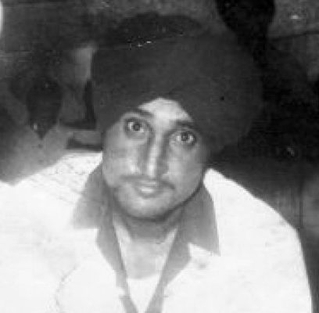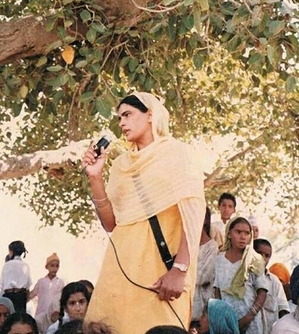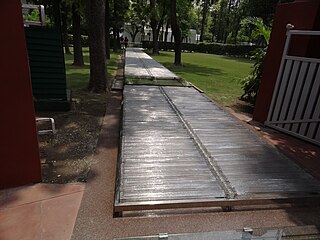
The Khalistan movement is a separatist movement seeking to create a homeland for Sikhs by establishing an ethno‐religious sovereign state called Khalistan in the Punjab region. The proposed boundaries of Khalistan vary between different groups; some suggest the entirety of the Sikh-majority Indian state of Punjab, while larger claims include Pakistani Punjab and other parts of North India such as Chandigarh, Haryana, and Himachal Pradesh. Shimla and Lahore have been proposed as the capital of Khalistan.

Amritsar, historically also known as Rāmdāspur and colloquially as Ambarsar, is the second-largest city in the Indian state of Punjab, after Ludhiana. Located in the Majha region, it is a major cultural, transportation and economic centre. The city is the administrative headquarters of the Amritsar district. It is situated 217 km (135 mi) north-west of Chandigarh, and 455 km (283 mi) north-west of New Delhi. It is 28 km (17.4 mi) from the India-Pakistan border, and 47 km (29 mi) north-east of Lahore, Pakistan.

Shiromani Akali Dal (Amritsar) is a hard-line Sikh nationalist political party led by Simranjit Singh Mann, it is a splinter group of the Shiromani Akali Dal in Punjab, India. They use 'Balti', the Punjabi term for bucket as their official election symbol. Shiromani Akali Dal (Amritsar) was formed on 1 May 1994. The party has seen a resurgence in support after the deaths of Deep Sidhu and Sidhu Moose Wala who were supporters and seen as sympathetic to the cause of Simranjit Singh Mann. Their 2022 Lok Sabha victory after more than two decades has been viewed as a resurgence in a political vacuum due to collapse of other traditional political parties in Punjab. The last major victory for Shiromani Akali Dal (Amritsar) was in the 1989 Lok Sabha elections, where the party and their allies won 10 out of 13 seats from Punjab.

Satwant Singh was one of the bodyguards, along with Beant Singh, who assassinated the Prime Minister of India, Indira Gandhi, at her New Delhi residence on 31 October 1984. His attacks were in retaliation of Indira Gandhi's Operation Blue Star.

Kanwar Pal Singh Gill was an Indian Police Service (IPS) officer. He served twice as DGP for the state of Punjab, India, where he is credited with having brought the Punjab insurgency under control. While many see him as a hero, there are accusations that he and the forces under his command were responsible for "multiple cases of human rights violation", "in the name of" stamping out terrorism. He was also convicted in a sexual harassment case. Gill retired from the IPS in 1995.

Jagdish Tytler is an Indian politician and former Member of Parliament. He has held several government positions, the last being as Minister of State for Overseas Indian Affairs, a post from which he resigned after publication of a report by an official commission of inquiry, known as the Nanavati Commission.

The Insurgency in Punjab was an armed campaign by the separatists of the Khalistan movement from the mid-1980s to the mid-1990s. Economic and social pressures driven by the Green Revolution prompted calls for Sikh autonomy and separatism. This movement was initially peaceful, but foreign involvement and political pressures drove a heavy handed response from Indian authorities. The demand for a separate Sikh state gained momentum after the Indian Army's Operation Blue Star in 1984 aimed to flush out militants residing in the Golden Temple in Amritsar, a holy site for Sikhs. Terrorism, police brutality and corruption of the authorities greatly exacerbated a tense situation. By the mid-1980s, the movement had evolved into a militant secessionist crisis due to the perceived indifference of the Indian state in regards to mutual negotiations. Eventually, more effective police and military operations, combined with a policy of rapprochement by the Indian government and the election loss of separatist sympathizers in the 1992 Punjab Legislative Assembly election, largely quelled the rebellion by the mid-1990s.

Harbhajan Singh Mann is an Indian-Canadian singer, actor and film producer associated with Punjabi music and cinema. His movies include Jee Aayan Nu (2002), Asa Nu Maan Watna Da (2004), Heer Ranjha (2009) and Jag Jeondeyan De Mele (2009).

Punjabi cinema, also known as Pollywood or Punjwood, is cinema dedicated to the production of motion pictures in the Punjabi-language widely spoken in the Indian state of Punjab. It is based in Amritsar, Ludhiana, and Mohali.
Amitoj Maan is an Indian actor, director, author, and screenwriter known for his works in Punjabi and Hindi films. He made three films: Kaafila based on the concept of illegal immigration, Hawayein, based on the aftermath of Indian Prime Minister Indira Gandhi's assassination and Sucha Soorma. .Hawayein was well received, however Mann was less successful with Kaafila, which was banned in Pakistan due to the film's perceived anti-Pakistan material.

Bibi Bimal Kaur was an Indian politician and the wife of Beant Singh, one of the two assassins of Indira Gandhi.

Indian prime minister Indira Gandhi was assassinated at 9:30 a.m. on 31 October 1984 at her residence in Safdarjung Road, New Delhi. She was killed by her Sikh bodyguards, Satwant Singh and Beant Singh, in the aftermath of Operation Blue Star by the Indian Army between 1 and 8 June 1984 on the orders of Gandhi. The military operation was to remove Sikh militant Jarnail Singh Bhindranwale and other Sikh separatists from the Golden Temple of Harmandir Sahib in Amritsar, Punjab, the holiest site of Sikhism. The military action resulted in the death of many pilgrims as well as damage to the Akal Takht and the destruction of the Sikh Reference Library.

Harvinder Singh Phoolka, is a senior advocate of Delhi High Court, politician, human rights activist, and author. He served as the Leader of the Opposition in the Punjab Legislative Assembly.

Rimpy Kaur "Mahie" Gill is an Indian actress, working in the Hindi and Punjabi film industries. She is best known for her role of Paro in Anurag Kashyap's critically acclaimed Hindi film Dev.D, a modern take on Sarat Chandra Chattopadhyay's Bengali novella Devdas, for which she also won the Filmfare Critics Award for Best Actress in 2010. She started her career in Punjabi films before making a debut in Bollywood with Dev.D.

The 1984 anti-Sikh riots, also known as the 1984 Sikh massacre, was a series of organised pogroms against Sikhs in India following the assassination of Indira Gandhi by her Sikh bodyguards. Government estimates project that about 2,800 Sikhs were killed in Delhi and 3,350 nationwide, whilst other sources estimate the number of deaths at about 8,000–17,000.

Diljit Dosanjh is an Indian singer, actor and film producer who works in Punjabi and Hindi cinema. Dosanjh entered the Social 50 chart by Billboard in 2020. He has been featured in various music charts, including the Canadian Albums Chart, the UK Asian chart by Official Charts Company and the New Zealand Hot Singles. His films, including Jatt & Juliet 2, Sajjan Singh Rangroot and Honsla Rakh are among the highest grossing Punjabi films in history.

Tejinder Singh "Babbu" Maan is an Indian singer-songwriter, music director, actor and film producer. Most of his artistic work focuses on Punjabi music and films. He is recognised as being among the biggest artists in Punjabi music.

Sonampreet Bajwa, professionally known as Sonam Bajwa, is an Indian actress who predominantly works in Punjabi films. Bajwa is a recipient of two PTC Punjabi Film Awards along with nominations for four Filmfare Awards Punjabi.
Shipra Goyal is an Indian singer, popular for her songs like "Ishq Bulava", "Angreji Wali Madam", "Ungli", "Tutti Bole Wedding Di", "Yadaan Teriyaan", "Lovely VS PU", "Mainu Ishq Lagaa" and "Paro".

















